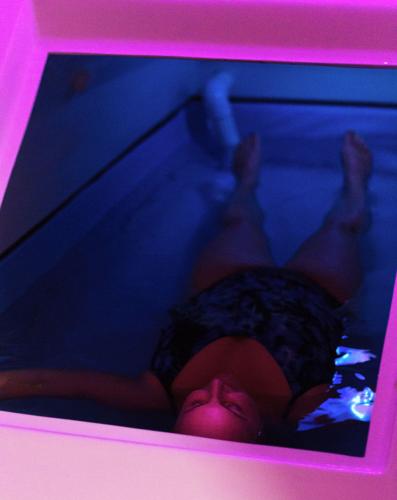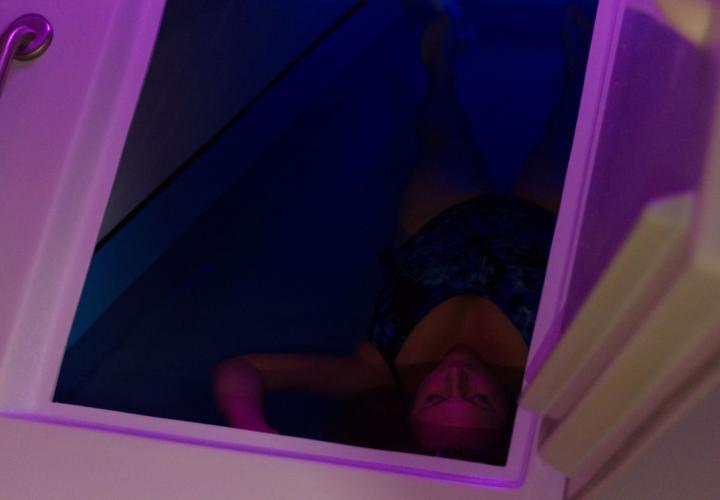Flotation therapy was invented in the 1950s and caught on in the 1980s thanks partly to the movie “Altered States,” in which William Hurt played a professor experimenting with sensory deprivation using an isolation tank.
After a lull in interest, floating has made a comeback back across the nation — including in Arizona and Tucson — thanks in part to publicity from celebrity users like NFL quarterback Tom Brady and other members of the New England Patriots.
Sometimes known as sensory deprivation or more recently, “restricted environmental stimulation therapy” (REST) or simply “floating,” flotation therapy uses tanks of skin-temperature salt water in which users float practically weightless in a lightless, silent environment.
Proponents say floating promotes health through relaxation and meditation. Some studies have shown that floating can aid athletic performance, ease pain, increase mindfulness and reduce stress.
Two flotation therapy centers have opened in Tucson since 2015 and are expanding, and the Phoenix area is also home to a growing number of float centers.
Industrywide figures aren’t readily available, but the Float Conference, held annually in Portland, Oregon, since 2012 has grown by 100 each year to more than 700 attendees last year.
One float center in Tucson represents comeback of sorts for its owner.
Kalyn Wolf, who owned Cloud Nine Flotation in Tucson back in the late 1980s, reopened Cloud Nine in 2016 after losing a lucrative job selling products for a business credit-services company.
“One day I started getting that gnawing feeling that I should get back into the healing arts,” said Wolf, who has been a master in the art of Reiki, a form of energy healing, for decades.
It finally dawned on her that a flotation business was a viable option, and after plunging in to research the subject, she was surprised to discover a resurgence in interest in floating.
“I didn’t know flotation had taken off again … I found it’s bigger than it ever has been,” she said.
Wolf set up her first tank in her new Cloud Nine studio in her east side home in September 2016, where she also offers Reiki and sound and crystal therapies.
In January, she bought a second tank from a woman she met at a local farmers market and refurbished it. Though floating is a solitary practice, with two tanks friends can arrive together and share their experiences, Wolf said.
Wolf said her clients have included athletes, people with chronic pain and those seeking a deeper meditation experience.
Besides Cloud Nine, Tucson has two other float studios, Levity Floatation and Wellness on East Speedway and Still Waters, which has operated from a home on the west side since 2005.
There are a half-dozen float sites in the Phoenix area, including franchises of True REST Float Spas, which was founded in Scottsdale in 2009 and has 16 locations in six states with four more planned.
Kristina Olivarez co-founded Levity Floatation and Wellness on East Speedway in 2015.
“Really I just love floating myself, and I want to promote anything that will get people to get to know themselves,” she said.
Levity, Tucson’s only storefront floating center, also offers services including massage therapy, acupuncture and an infrared sauna.
Olivarez said she plans to install its second tank — a walk-in design with a room built around a topless tank — in the next few weeks, Olivarez said.
The new tank, which will also feature color-therapy lighting, should help assuage the fears of claustrophobic clients, she said.
Though float centers aren’t regulated by local health authorities like public pools and spas, tanks typically come with sophisticated filtration and disinfection systems.
For starters, the high concentration of Epsom salts — Wolf uses 800 pounds in each tank’s — prevents the growth of most organisms, much like the highly saline Dead Sea bordering Israel and Jordan.
“Nothing lives in there — they don’t call it the Dead Sea for nothing,” Wolf said, noting that the salt water makes the body float unaided.
At Cloud Nine, float water is filtered and disinfected with a process including hydrogen peroxide, ultraviolet light and ozone.
As a form of alternative medicine, flotation has been touted as a treatment for psychological conditions like depression and anxiety as well as physical ailments including chronic pain, hypertension and rheumatoid arthritis.
In 2005, a meta-analysis of clinical trials on flotation therapy by Dutch researchers found that the trials were generally small and highly prone to error, but the use of isolation tanks “can be a useful stress management tool.”





